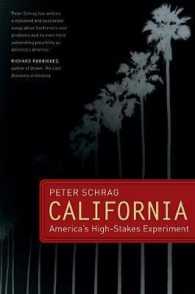- ホーム
- > 洋書
- > 英文書
- > History / World
Full Description
Peasants have been despised, underrated, or disregarded in the past. Historians and archaeologists are now giving them a more positive assessment, and in Peasants Making History, Christopher Dyer sets a new agenda for this kind of study. Using as his example the peasants of the west midlands of England, Dyer examines peasant society in relation to their social superiors (their lords), their neighbours, and their households, and finds them making decisions and taking options to improve their lives. In their management of farming, both cultivation of fields and keeping of livestock, they made a series of modifications and some dramatic changes, not just reacting to shifts in circumstances but also devising creative initiatives. Peasants played an active role in the development of towns, both by migrating into urban settings, but also by trading actively in urban markets. Industry in the countryside was not imposed on the rural population, but often the result of peasant enterprise and flexibility. If we examine peasant attitudes and mentalities, we find them engaging in political life, making a major contribution to religion, recognizing the need to conserve the environment, and balancing the interests of individuals with those of the communities in which they lived.
Many features of our world have medieval roots, and peasants played an important part in the development of the rural landscape, participation of ordinary people in government, parish church buildings, towns, and social welfare. The evidence to support this peasant-centred view has to be recovered by imaginative interpretation, and by using every type of source, including the testimony of archaeology and landscape.
Contents
1: Introduction
2: Peasants and landscapes
3: Peasant society: landholding and status
4: Peasants changing society
5: Family and household
6: Peasants and their crops
7: Peasant farming: livestock and pasture
8: Peasants and towns
9: Peasants and industry
10: Peasant outlook, values, perceptions, and attitudes
Conclusion








